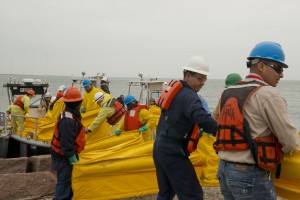Texas Still Learning When It Comes to Oil Spill Response

REUTERS /US COAST GUARD /LANDOV
Responders load hundreds of feet of boom onto vessels at the Texas City Dike in this U.S. Coast Guard photo taken March 23, 2014.
Two dozen boats and over 500 people are now involved in the response to an oil spill from Saturday that closed the Houston Ship Channel.
What spilled was a heavy fuel oil, called bunker fuel, which was carried in a barge that collided with a ship. Up to 168,000 gallons were dumped into the channel.
“Last ten years, I haven’t seen a spill like this,” says Larry McKinney, the head of a Gulf research institute at Texas A&M Corpus Christi. “Before that, we’d see them, seems like, every other year.”
McKinney knows a thing or two about the devastation of oil spills, having headed up natural resource protection for the State of Texas and working on spill prevention and response for decades.
“These spills here in Galveston are becoming less frequent. That’s the good thing,” he says.
A decade or two ago, McKinney says spills were more common and the state was less prepared. And now when spills do happen, there is more equipment stored along the coast, thanks to funding from a state fee on oil.
McKinney says it makes Texas the best state in the Gulf when it comes to a fast response. But what he says hasn’t improved is what to do about oil if it does reach delicate wetlands.
“I don’t think we’re any better prepared now to deal with clean up,” McKinney says. “What I’m afraid we’ll see, [and] I hope that we don’t see it, if there’s oil that reaches into wetlands and marshes, I hope we don’t see a bunch a people out there with big white pads in the marshes trying to pat the oil up. They will do far more damage that just leaving the oil.”
Eventually, he says bacteria and microbes eat up the oil.
But that’s onshore, what about the oil that may remain out in the Gulf?
“I’d be concerned with heavy bunker fuel, it might contain quite a bit of toxic material to it,” Paul Montagna, also with Texas A&M Corpus Christi, says.
Montagna studied the crude oil that spewed from the 2010 Deepwater Horizon drilling rig blowout.
“That was something that was unexpected — oil floats, so everybody expected the oil to come to the surface and not impact the deep sea,” he says. “But we found the opposite was happening. “
Some of the oil sank to the bottom of the Gulf where, according to Montagna, it killed off sea creatures and organisms that live thousands of feet below the surface.
That’s why he and other scientists say that while spills may have been polluting the Gulf for decades, there is still much to learn about how best to clean them up.